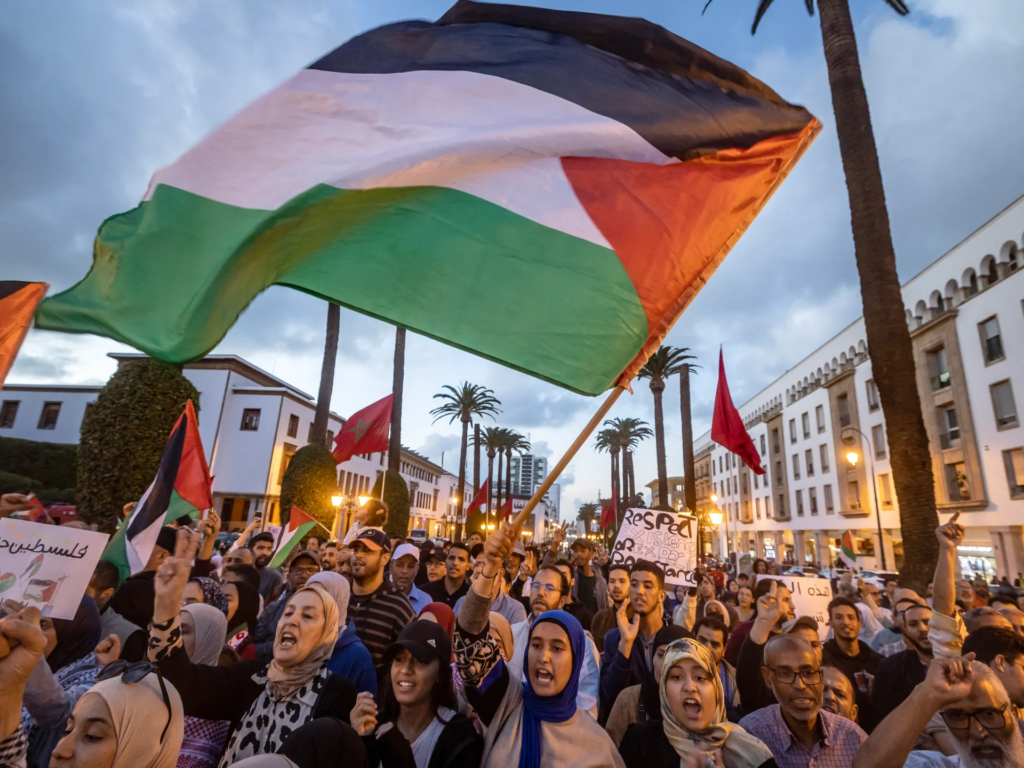
Across the Arab world, a bitter contradiction has emerged. In the streets of Cairo, Beirut and Rabat, crowds still chant passionately for Gaza and the Palestinian cause. Yet behind the marble halls of power, many Arab rulers have grown conspicuously quiet.
The Palestinian cause, once the beating heart of pan-Arab identity has waned in the priorities of today’s regimes. Once the Palestinian struggle defined Arab nationhood; now it often passes silently through corridors of power. Why?
From Pan-Arabism to Pragmatism
When Israel was created in 1948, Palestinians’ plight “shocked the Arab world” and their liberation became a pan-Arab cause. Egypt’s Nasser and others fused Arab identity with Palestinian solidarity. But after those heady days, the calculus shifted.
As Arab regimes consolidated power “the draw and utility” of the Palestinian cause for leaders “slowly began to fade”. By the 1980s, many rulers had grown dependent on American support and wary of domestic upheaval. In short, Palestinian liberation was no longer their top priority, replaced by regime survival and narrow national interests.
Yet Arab publics remain overwhelmingly pro-Palestine.
A recent poll found 95% of Moroccans view Palestine as a pan-Arab issue.Nevertheless, Rabat resists ending its peace with Israel: officials fear the fallout with Washington and allies (for Morocco this even involved U.S. backing of its Western Sahara claims).
The UAE likewise frames normalization as “irreversible,” blaming Palestinian leaders for any setbacks. Bahrain, too, exemplifies the trade-off: it briefly tolerated Gaza protests but then banned them and detained dozens of activists late last year. In each case, governments chose strategic ties and stability over solidarity.
- Historical cause vs. regime interests: Palestinian liberation was once the linchpin of Arab nationalism, but today many rulers treat it as a foreign-policy bargaining chip.
- Normalization trade-offs: The 2020 Abraham Accords (peace deals with the UAE, Bahrain, Morocco) were sold as steps toward Palestinian peace, but analysts note they “held nothing of value” for the Palestinians.
- Survival over solidarity: Arab leaders now prioritize American alliances and internal order. Experts warn this reliance is “backfiring”: any government seen to betray Palestine risks being branded a collaborator at home.
- Unchanged public sympathy: Across the region, citizens remain deeply committed to Palestine (e.g. 95% in Morocco). This mismatch is striking: in Jordan in 2021, pro-Palestinian protests forced a government to recall its ambassador from Israel, showing even monarchs cannot ignore mass sentiment.
In practice, official support now stays mostly rhetorical. Arab states issue condemnations and promise humanitarian aid, but they stop short of any real challenge to Israel.
Many governments confine their actions to “deceptive rhetoric and symbolic gestures,” enough to placate publics but avoiding any serious clash.Even Bahrain’s crackdown on demonstrators speaks volumes about priorities: by year’s end it had detained dozens of women and children advocating Gaza, signaling regime stability over popular sympathies.
For many Arab rulers, then, Gaza has become a matter of image, calls for ceasefires and donations, but no weapons or direct intervention.
The Ruler-Ruled Gap and its Costs
The gulf between Arab rulers and their people is now dangerously wide. For ordinary citizens, Palestinian statehood remains existential. Bahrain’s newly freed political prisoners, for instance, greeted release by chanting “Palestine!”. But for authoritarian governments, even large pro-Palestine gatherings are seen as threats.
Scholars observe that states have become “allergic” to popular mobilization, fearing that empowering this cause could encourage broader dissent. In practice, regimes suppress or strictly regulate protests to avoid any challenge to their own legitimacy.
Ironically, analysts emphasize that the Palestinian cause still stands as “the cornerstone” of Arab regimes’ legitimacy. Many governments react strongly when Gaza’s fate is debated abroad, Egypt’s Sisi denounced any talk of displacing Gazans to Sinai, and Saudi leaders reaffirmed Jerusalem as Palestine’s capital.
These gestures reflect the deep anxiety of rulers. Yet they also highlight how impossible it is to appease both Washington and the Arab street at the same time. For now, leaders find themselves torn: they rely on U.S. aid (Egypt is the world’s third-largest recipient) yet face an outraged populace.
Even modest public outcries have forced concessions; as noted, Jordan’s 2021 protests compelled an ambassadorial recall, showing that even kings cannot ignore the street.The practical consequences are stark. Arab people openly question why their countries’ massive militaries and budgets never seem to aid Gaza. In Jordan and Lebanon, frustrations have boiled over into protests. Meanwhile, Israel’s occupation and settlement expansion continue largely unchecked, a testament to the limits of purely rhetorical support.
Palestinian leaders today must reckon with an Arab world that speaks loudly of solidarity but acts only in whispers. The old assumption that Arab capitals would rally to their aid has been broken.
Looking Ahead
For Palestinians, this situation is grim. Their struggle now hinges more on their own agency and popular sympathies than on any elite patronage. The promise that “Arab support” would translate into action has proven illusory. If even Egypt and Jordan, once pillars of the cause, refuse to rock the boat, it is hard to see who will.
For readers, this paradox is deeply unsettling. Can a people achieve statehood if their proclaimed allies only mouth slogans? Or will future crises force Arab regimes to choose between survival and solidarity?
Right now, survival has won out: Arab states have traded fiery rhetoric for cautious pragmatism. The Palestinian cause remains alive in the hearts of millions, but in statecraft it has been largely downgraded to a talking point.
The question now is whether that gap between the street and the palace can ever truly be bridged and if not, what it means for the future of Gaza and Arab politics.
